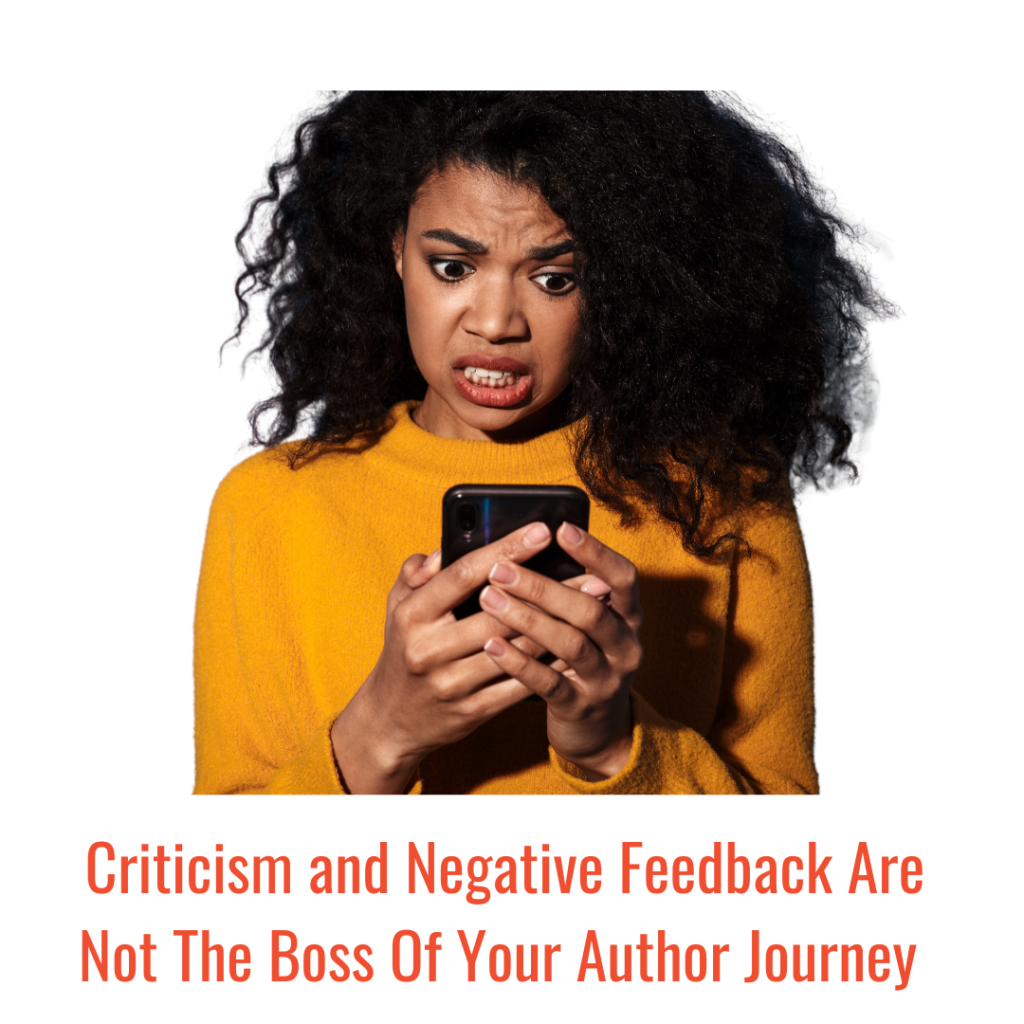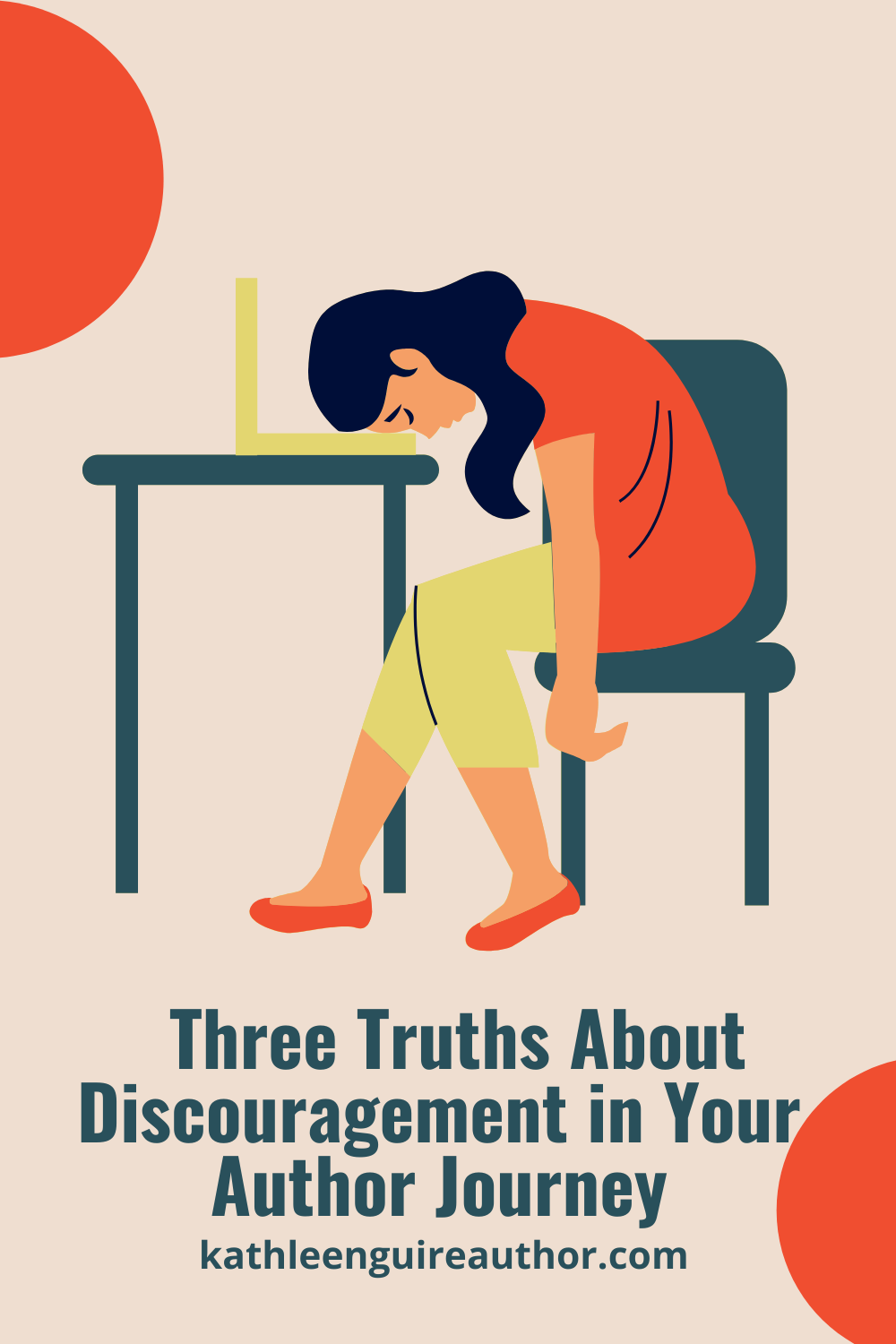Three Truths About Discouragement in Your Author Journey
Discouragement in Your Author Journey
We often think discouragement comes AFTER we have started something.
We may expect it in the messy middle.
But do you expect it as a deterrent from getting started writing your book?
Many of us face discouragement in our author journey before we put pen to page.
Before I started writing my first book, I imagined scenes of what writing a book would look like. I had dreams of sitting in cafes drinking coffee and plonking away on an old typewriter (I’m obsessed with them). Then I would talk to a friend and tell them I was writing a book. Or have someone read something I had written, and get some negative feedback. Discouragement would creep in. And I would ask myself – Who am I to write a book? My degree is in math and education. I had no business writing a book.
Maybe that’s you. Maybe discouragement is invading your thoughts before you even start. You have the desire to write a nonfiction book. You have an idea of what you want to write about and who you want to write for.

Struggling with self-doubt as a writer? You’re not alone.
Every writer faces that little voice whispering, “Who am I to write this?” But here’s the truth—mindset is the biggest difference between writers who finish their books and those who don’t. 🚫 You don’t need more time.
🚫 You don’t need permission. ✅ You need the right mindset.
Then your inner critic pipes up and says -who are you to write a book?
- Look at So and So, she has an English degree and she’s written three books. (Comparison)
- You don’t have the education to do this. You didn’t go to college. (Lack of Education)
- You can’t spell. (Writing Weakness)
- You’re not cohesive. (Writing Weakness)
And before you know it, you’ve convinced yourself you shouldn’t write that book. Leave it for the professionals you think. Then you bury your desire. And every day you live with the fear that you are missing part of your purpose. May I tell you something I’ve learned about discouragement?

1. Discouragement has nothing to do with your ability, talent, or education.
Discouragement robs us of our purpose. Discouragement actually doesn’t care if you have the education, ability, or tools to do what you desire. That’s the strange thing about discouragement. It has nothing to do with your ability, talent, or education.
Let me give you an example.
My youngest son is one of the strongest swimmers I know. He was on a swim team in high school. Now in his early twenties, he can outswim any teen and adult who challenges him. He had a strong desire to swim from the time he was a toddler and then he had the training to do so. At two years old, he swam underwater and held his breath for so long, that it freaked me out. I made a habit of swimming beside him. I pulled him out of the water and waited for him to breathe before letting him go back under.
When he was a tween, we went to a local state park. All of his siblings were swimming across a large pond. He asked if he could too but he was afraid of the murky middle (no, he didn’t say that and he would deny it. I’m his mom, so I knew). I swam beside him. We got to the middle and he panicked. He grabbed onto me and said, “I can’t do it.” I was going under and trying to encourage him when I bobbed up for a breath. Finally, I said, “Let’s go back, then.” He turned around and promptly swam back with a strong stroke, leaving me in the middle of the pond, treading water.
Why was this super strong swimmer not able to make it across the pond? He gave into discouragement before he even started. He convinced himself he couldn’t before he took the first stroke. I’ve given in to discouragement in my author journey before I even started. Have you?
Discouragement doesn’t measure your ability or talent before it attacks. Discouragement sees a crack in your confidence and squeezes in. Once discouragement has found a foothold in your mind, it has won. You set your pen down. Close the laptop. And quit. But it doesn’t have to be that way. If you know the truth – that discouragement has nothing to do with your ability, talent, or education… you can avoid giving discouragement power over you.
dis·cour·age·ment- a loss of confidence or enthusiasm; dispiritedness.

2. Confidence Comes From The Message You Have To Share
One of the antonyms of discouragement is confidence. We want to have confidence in our writing ability. In our purpose. We must have confidence in the message we have to share.
Do you want to know what I’ve learned about confidence in writing? It doesn’t come with more time or waiting for it to appear. Do you know how confidence actually grows? Stepping out and doing the thing. Do you know what writers do? Writers write. So write.
Do you know what feeds your confidence? Faith in the message you have to share. You feel passionate about the message you have to share. You have a story of transformation and truth. Your story is keeping you up at night. It creeps into your thoughts while you go about your day. You dream of helping others overcome what you struggled with.
When you feel passionate about your message – you write.
When you have a story to tell, a message that you know you need to get out there to help others, it trumps how you feel about it. How do I know? That’s what finally happened with my first book, and my second, and every book I’ve written since then.
Most people won’t continue doing something they aren’t passionate about, especially when it gets hard. Putting an activity through painful practice is a great way to determine your direction in life. If you can do something when its not fun, even when you’re exhausted and bored and want to give up, then it might just be your calling.
Jeff Goins, The Art of Work
When I started writing my first book, I didn’t know if anyone would read it. Or how I was going to publish it. Who would edit it? Who would design the cover? Etc…
I took the leap and signed up for a Memoir Writing Class. Although I learned a few things, I walked away from that class with more discouragement than I had when I started.
Sometimes education isn’t the only answer. Often teachers/mentors have an idea of how you should write. But it’s not your idea. Or your way of writing. Be true to yourself. Don’t think that mentors/teachers are always correct when it comes to the craft of writing (including me). I’m not saying – don’t take the class, read the books, and learn more about the craft of writing. What I’m saying is:

3. Criticism and Negative Feedback Are Not The Boss Of Your Author Journey
Don’t let the criticism from teachers/mentors be the voice in your head that discourages you from writing.
When I was in the middle of the memoir writing class, my instructor bounced from hot to cold on my assignment reviews. For one assignment, I saved her positive comments, printed them, and taped them into my journal. Then the next assignment she criticized me, not for my writing style but for my content.
I reached out to my dad who has a doctorate in English. His writing ability is exponentially higher than mine. He said, “Kathleen, that’s why I discourage you from taking those classes. Don’t let anyone tell you how to write. You have your own style.”
He wasn’t saying that education isn’t important in the area of writing. He knows me. He knows how I absorb criticism. My dad shared with me that once you know the fundamentals of writing, you create something that is uniquely you.
Go deep and try to tell the truth. Dig in, put on your writing clothes, grab your favorite pen, and immerse yourself in the process.
Eric Maisel
You have a transformation that is uniquely yours. You feel impressed to share it through a book. You can do it. If the criticism is constructive, at least review your work and see if you need to change anything. If the criticism focuses on changing your theme or your unique way of writing, then keep doing what you are doing. Once you have learned the rules of writing, don’t let negative feedback be the boss of your writing journey. Only you can write the way that you do.

Struggling with self-doubt as a writer? You’re not alone.
Every writer faces that little voice whispering, “Who am I to write this?” But here’s the truth—mindset is the biggest difference between writers who finish their books and those who don’t. 🚫 You don’t need more time.
🚫 You don’t need permission. ✅ You need the right mindset.
My Novel Writing Education and Learning Curve
Before I wrote my first novel, I took a novel-writing class with my son. But I didn’t let discouragement direct me. I felt the freedom to write the way I am designed to write. Hopefully, you can too. I’m only sharing my experiences so you can avoid the discouragement pitfall as much as possible.
When you are looking for a class to enroll in for crafting your book –
- Find classes/ resources that provide you the tools you need – such as framework, structure, and organizing your writing ( I recommend our resource- The Six-Step Roadmap For Crafting Your Nonfiction Book)
- Avoid classes that try to tell you what content to share.
- Use classes/resources that inspire you to write your story. Share your Transformation. Those are uniquely yours.
There are readers out there that need to hear exactly what you have to say.
The memoir writing teacher wanted me to change my content. My message. Don’t sign up for a class that asks you to change your story. Do you want feedback on your work? That’s a good thing. If the teacher/writing coach asks you to change your content – not to share what you are passionate about, then turn and run as fast as you can. Click out. Stop. Listening. Find someone who will revise for clarity. Edit for spelling and grammar errors, not talk you out of sharing your transformation.
Now you’re probably wondering what my memoir teacher was criticizing – it was my vision for helping a million orphans. At the time, I had no idea how I would do that. I just had the vision to do so. She said I sounded “unhinged.” I’m okay with it now. But when I received the “unhinged” feedback, a week after receiving positive feedback, I cried. I swam around in the pool of discouragement. I believed she was right because she was the teacher. She was trying to take control of my story and tone it down. But when it came right down to it, I couldn’t change my message. Thankfully, I finished the class, retained the actual writing elements, wrote the book with passion, and didn’t tone down my message. I titled the book Positive Adoption which later became A Positive Adoption Story.
I know I’m talking a lot about my journey. But it’s only for the sake of helping you. If you can step over discouragement as much as possible because I shared, then it’s worth it.
Don’t let discouragement be your guide. Step over it and write the book.
Discouragement often has nothing to do with your ability, talent, or education. Discouragement doesn’t measure your ability or talent before it attacks. Discouragement sees a crack in your confidence in your talent and ability and squeezes in. Once discouragement has found a foothold in your mind, it has won. You set your pen down. Close the laptop. And quit. But it doesn’t have to be that way. If you know the truth – that discouragement has nothing to do with your ability, talent, or education, you can avoid giving discouragement power over you.
Confidence Comes From The Message You Have To Share. When you feel more passionate about what you have to share than discouragement you share. When you feel passionate about your message – you write. What do writers do? They write. So write.
Criticism and Negative Feedback Are Not The Boss Of Your Author Journey. Don’t let anyone tell you how to write. You have your own style. You have a story to share. You have a transformation that is uniquely yours. You feel impressed to share it through a book. You can do it. If the criticism is constructive, at least review your work and see if you need to change anything. If the criticism focuses on changing your theme or your unique way of writing, then keep doing what you are doing. Once you have learned the rules of writing, don’t let negative feedback be the boss of you.

Struggling with self-doubt as a writer? You’re not alone.
Every writer faces that little voice whispering, “Who am I to write this?” But here’s the truth—mindset is the biggest difference between writers who finish their books and those who don’t. 🚫 You don’t need more time.
🚫 You don’t need permission. ✅ You need the right mindset.

